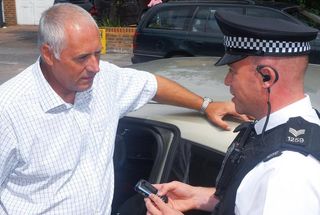Bedfordshire Police finds BlackBerry devices very arresting
BlackBerry devices are the way forward for Bedfordshire's officers who want to spend more time solving crime and helping the local community and less time at a desk in the station.

Police officers in Bedfordshire are being equipped with Blackberry handheld devices so that they can spend more time deterring and solving crimes through public visibility and less time tied to an office-based computer.
By February next year, more than 1,000 front-line officers will be making use of the T-Mobile-powered devices to access the Police National Computer (PNC), Police National Legal Database (PNLD) and other key force systems such as the briefings, intelligence and warrants databases.
Following successful five-month trial with 40 officers, some 550 front-line staff are already up and running with the handhelds, which take - for officers already trained in how to use the PNC - just a few hours to get to grips with," according to Inspector Jim Hitch, the project manager spearheading the initiative for Bedfordshire Police.
"The past 15 years have been about computerising things. We've computerised all systems but mobilised noting and officers are returning to police buildings to update computer systems. This [project] was about reversing that trend and giving officers a means of accessing that information while they're out and about," he said.
Bedfordshire's previous experience with BlackBerry devices had been limited to senior executives rather than those on the beat. It ultimately decided to go down the BlackBerry route for front-line officers because it found other solutions very complicated in comparison and needed something that, in addition to meeting officers' requirements, would be easily supported by its small IT department, Hitch said.
Officers can enter information relating to jobs in real-time and then obtain data about their next job in the same way, making them much more efficient and enabling them to spend more time out in the community rather than fighting for a free computer back at the station.
National Policing Improvement Agency (NPIA)
Get the ITPro. daily newsletter
Receive our latest news, industry updates, featured resources and more. Sign up today to receive our FREE report on AI cyber crime & security - newly updated for 2024.
"I think this [project] is different as for a start it costs a fraction of anything else and is a ready-made system that is simple and proven. Most cost comes from people waiting. Equipment is relatively inexpensive so anything we can do to save time and increase efficiency means the cost of not doing it is harder than doing it," said Hitch.
"We've had loads meetings with other forces and it's still early days but everyone is learning and there is good practice coming out all over the place. All of that learning is being consolidated by the NPIA. We're part of five trial forces dong something around mobile data. But this is very much the start of the journey for us and there will be all sorts of applications going on the devices. I'm totally confident that this is the way forward for us."
Hitch added: "I liken this to the change from Police boxes to Police radio. That was a huge step and quit expensive and had its doubters who asked why we needed radios. What we're moving to now with these devices is a similar sort of scenario. There are people doubting and asking why we need them but I think that will become clearer and we will depend on these devices more and more and wonder how we ever did without them."
Maggie has been a journalist since 1999, starting her career as an editorial assistant on then-weekly magazine Computing, before working her way up to senior reporter level. In 2006, just weeks before ITPro was launched, Maggie joined Dennis Publishing as a reporter. Having worked her way up to editor of ITPro, she was appointed group editor of CloudPro and ITPro in April 2012. She became the editorial director and took responsibility for ChannelPro, in 2016.
Her areas of particular interest, aside from cloud, include management and C-level issues, the business value of technology, green and environmental issues and careers to name but a few.





